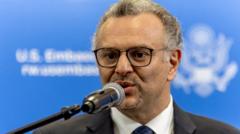Despite major aid cuts impacting health programs across Africa, US Senior Advisor Massad Boulos emphasizes Trump's interest in the continent's economic potential, advocating for transparency and efficiency in aid distribution.
Trump's African Strategy: Balancing Aid Cuts with Economic Interests

Trump's African Strategy: Balancing Aid Cuts with Economic Interests
A US envoy asserts Trump's commitment to Africa amid significant funding reductions and potential impacts on humanitarian aid.
In a recent interview with the BBC, US Senior Advisor for Africa Massad Boulos asserted that President Donald Trump considers Africa an important partner, even as the administration implements significant cuts to foreign aid that have raised alarms about humanitarian crises across the continent. These funding reductions, initiated on Trump’s first day in office as part of an "America First" approach, have swelled concerns regarding the future of US trade relations with African nations and the possible implications for various health and humanitarian programs.
Boulos affirmed Trump's regard for Africa, downplaying rumors of potential downsizing of US diplomatic missions on the continent. "He highly values Africa and the African people," Boulos insisted. However, critics point out that the aid cuts have profound ramifications for health initiatives, including vital medical supplies affecting countries like Nigeria, Kenya, and Lesotho, which are now facing shortages of HIV medications due to funding halts from the US Agency for International Development (USAID). The World Health Organization has issued warnings that nearly six million additional individuals across Africa may be plunged into extreme poverty next year if these aid reductions continue.
Recent tragic incidents, such as the reported deaths from cholera in South Sudan due to clinic closures linked to these aid cuts, have intensified scrutiny on the administration’s policy. Boulos, however, countered that there’s no direct causation between the aid cuts and these fatalities, stressing the necessity of evaluating existing aid programs for better efficiency and accountability. "We need to ensure that the funds are properly utilized and achieve their intended results," he remarked.
Additionally, Boulos highlighted growing interest from US companies in tapping into the mineral wealth of the Democratic Republic of Congo, a nation rich in resources crucial for electric vehicle technology. He stated that this economic engagement could also play a role in stabilizing the long-suffering region, where decades-old conflict remains a major challenge.
While acknowledging claims that the US might significantly reduce its diplomatic presence in Africa, Boulos completely rejected such narratives. He assured that "Africa is very important to Trump," emphasizing the administration's focus on establishing fair economic partnerships rather than viewing Africa solely through a lens of humanitarian aid.
The African Growth and Opportunity Act (AGOA), a trade framework designed to encourage commercial ties, may face uncertainties under the current Congress, impacting economically vulnerable countries like Lesotho, which relies heavily on exports of textiles to the US. The situation remains fluid as many African nations seek to renegotiate trade agreements, advocating for terms that benefit both sides. Boulos assured that the administration aims for fairness in trade dealings, leveraging Africa's resources while addressing the continent's developmental needs.




















